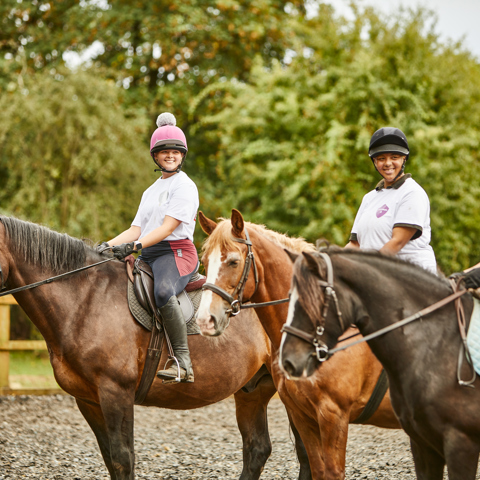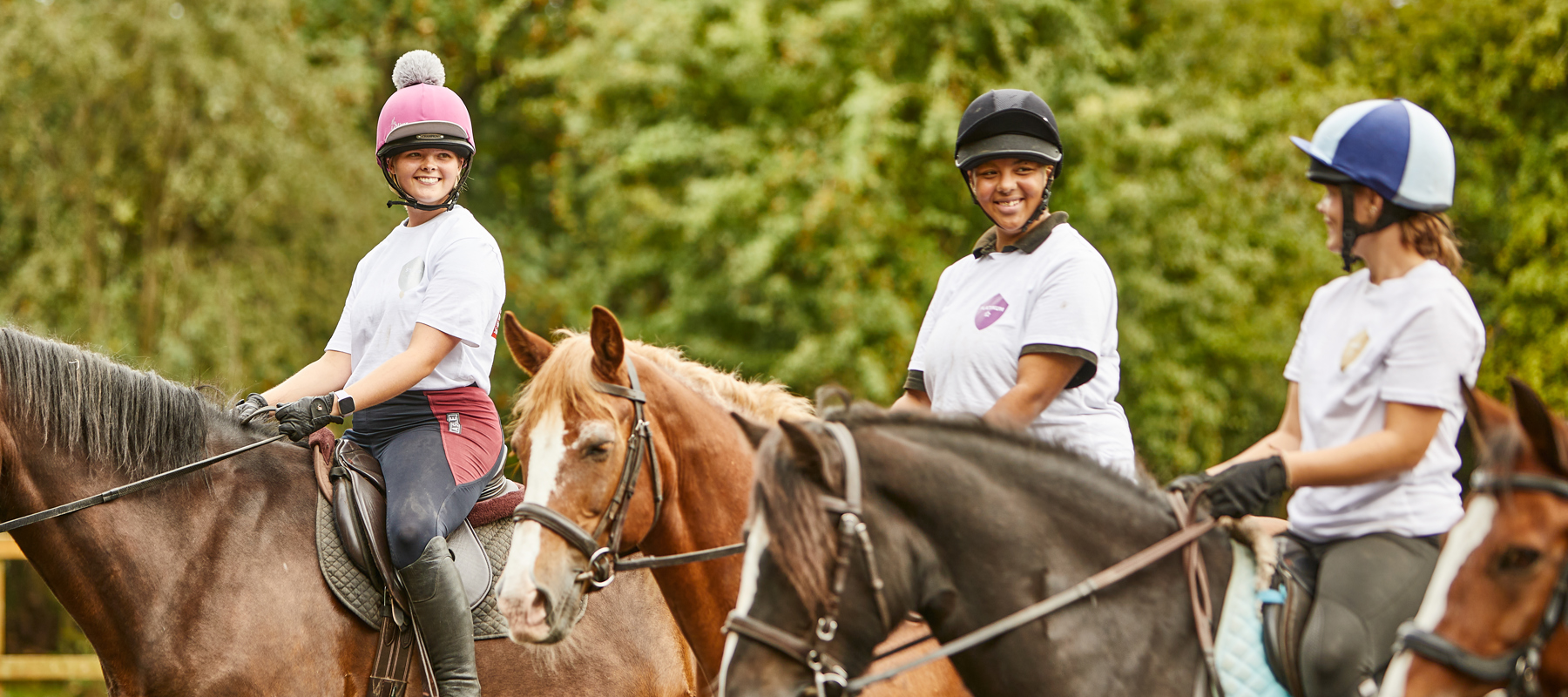About Stage 1
Whether you’re just beginning your journey with horses or if you have some experience, Stage 1 is a great place to start. Our Stage 1 qualifications are for:
- Anyone who wants to get started in a career within the equine industry.
- Anyone who wants to learn more about horses and how to look after them.
- Gaining confidence handling and working with horses.
- Learning the essentials of working safely and considerately with horses.
- Developing fundamental skills to ride with kindness and empathy for the horse.
There are non-riding and riding options available to suit your goals or career ambitions.
If you already have experience owning, riding or working with horses or equine qualifications you may wish to start at a higher qualification. Check out our direct entry information.
There are three qualifications at Stage 1. What you will learn and be assessed on depends on which Stage 1 qualification you choose.
Click on the links in the table below to read the qualification syllabus.
| Qualification | Assessments to take | ||
|---|---|---|---|
| BHS Stage 1 Care | Stage 1 Care | ||
| BHS Stage 1 Ride | Stage 1 Ride | Ride Safe Silver Challenge Award | |
| BHS Stage 1 Complete Horsemanship | Stage 1 Care | Stage 1 Ride | Ride Safe Silver Challenge Award |
What will I have to do?
To achieve a BHS Stage 1 qualification, you will need to sit a practical assessment at a BHS Approved Riding Centre. You will work through a series of practical activities and discussions under the guidance of our assessor. A Stage 1 Care and Ride assessment will usually take half a day, from arrival to finish. All you need to do is turn up prepared and ready to go! Safety and welfare of yourself, the horse and others is a priority. Safe practice will be at the forefront of your training and must be followed throughout your assessment.
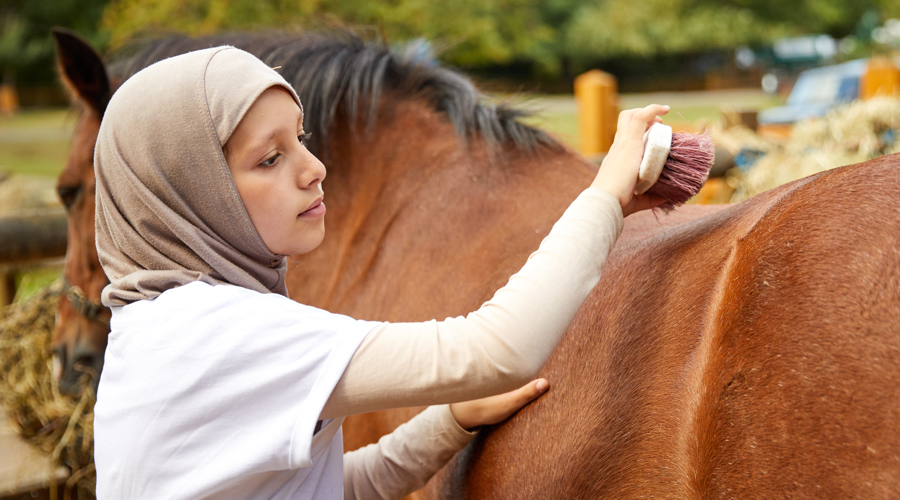
Stage 1 Care
What’s covered:
- Routine stable management and horse care tasks such as mucking out and grooming.
- Tacking up to include saddle, bridle and boots, as well as cleaning tack.
- Putting on and adjusting rugs.
- Handling and working with horses in a variety of environments.
- Basic horse behaviour, welfare and health.
- Routine health checks including field and stable safety checks.
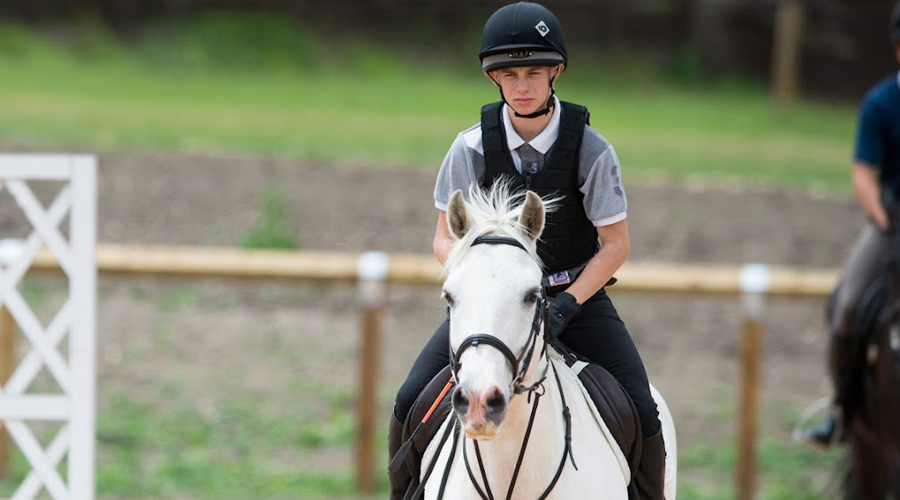
Stage 1 Ride
What’s covered:
- The horse’s needs and comfort during a riding session.
- Checking tack for safety and comfort in preparation for riding.
- Riding in walk, trot and canter, showing changes of direction, turns and circles.
- Riding without stirrups in walk and trot.
- Riding in trot and canter in a ‘light seat’ position.
- Riding over trotting poles.
- The aids for riding and how to apply these correctly and with empathy.
To achieve the Stage 1 Ride qualification, you also need to complete the BHS Ride Safe Silver Challenge Award. Find out more about Ride Safe.
Find out more about what to expect during the Stage 1 Ride assessment:
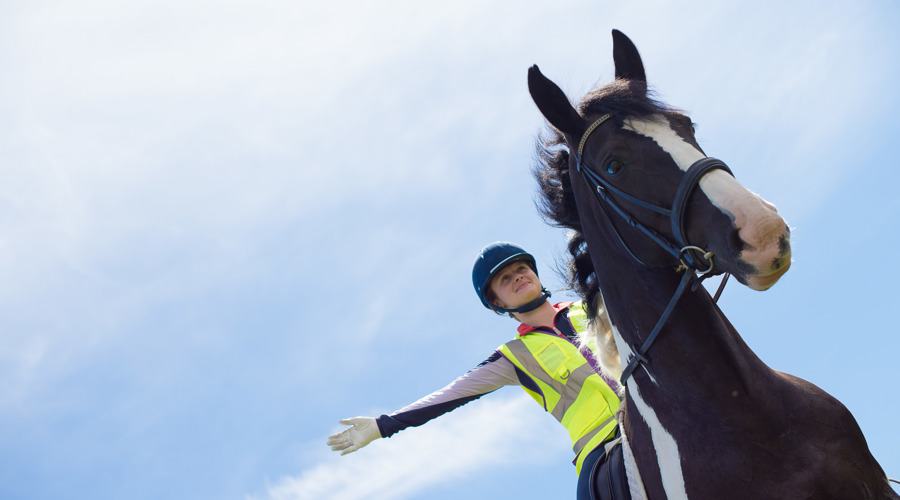
Ride Safe Silver Challenge Award
What's covered:
- Riding safely on the road, along rights of way, across agricultural land, at the beach and when warming up at competitions.
- Negotiating hazards.
- Understanding common signs.
- Dealing with conflict or difficult situations when riding out.
- Negotiating obstacles.
How to get started
We can help you to find lots of different training opportunities depending on how you like to learn.
1. Practical training
chevron-down
chevron-up
- Finding a coach or course through a BHS Approved Riding Centre means you will have the chance to work with and handle lots of different types of horses. This is a great way to gain experience first-hand. Most of our BHS Approved Riding Centres will hold the assessments so you can train for and then take your assessment at the centre you’re familiar with.
- Some centres run courses over a set number of weeks, often with the assessment at the end. You can also arrange tailored training at our centres if you want more flexibility with times and dates.
Find your nearest course.
Find your nearest BHS Approved Riding Centre. - If you have your own horse you can train with a BHS Accredited Professional Coach who could visit your yard. They will help to prepare you for your assessment by building your knowledge and skills. Find an Accredited Professional Coach.
- We also have a dedicated Facebook* group for people requesting or advertising training for BHS assessments.
Join the BHS Training Hub.
*Facebook requires users to be a minimum age of 13
2. Self-study
chevron-down
chevron-up
There are also options to top up your training with some home learning. Our ‘Complete Horsemanship Volume 1’ is the essential guide for this qualification. We also have our ‘Stage 1 Workbook’ and plenty of other books for you to read if you want to support your practical training. Visit our shop.
We have a series of ‘How to…’ videos that cover some of the skills you will be learning about. View our video library.
We also have lots of helpful advice on horse care and welfare.
3. How to book your assessment
chevron-down
chevron-up
If you're training at a BHS Approved Riding Centre, they may hold in-house assessments. They should be able to let you know if they offer this. If they do, you will book your assessment with them.
If they don’t offer in-house assessments, or you’re not training at a BHS Approved Riding Centre you can book your assessment directly with us.
Booking your assessment is quick and easy. View our assessment dates here and call us on 02476 840508 (during office hours) or alternatively, book your assessment online. Remember to have your BHS Membership number and a credit or debit card to hand for payment. If you are under 18, we need parent or carer consent to book the assessment. Payment plans are available.
4. Entry requirements
chevron-down
chevron-up
The entry requirements for any Stage 1 assessment are:
- A minimum age of 13 years old on the day of the assessment.
- BHS Silver Candidate Membership or Gold Membership. If you are taking your assessment at one of our international centres, you must be an International Full or International E-Member.
Assessment fees
Stage 1 Care assessment
Stage 1 Ride assessment
Stage 1 Care & Ride
(same day assessment)
Ride Safe Silver Challenge Award Fees are set by the coach or centre delivering the award.
We’re here to support you
We’re delighted to offer free Silver Candidate Membership for anyone training for and taking their Stage 1.
If you feel you would like additional support with accessibility at an assessment, please follow our Access Arrangements guidance.
If you need a bit more guidance on any aspect of our qualifications or you’re not sure where to start, then our friendly team will be happy to help. Simply get in touch by phone (02476 840508) or use our enquiry form.
What will I get from Stage 1 qualifications?
chevron-down
chevron-up
Stage 1 qualifications are an endorsement of your skills and knowledge at this level.
It will provide assurance to an employer that you can work safely with well-mannered horses carrying out daily routine tasks. This qualification may lead to employment if you are looking for work in the equestrian industry.
Stage 1 is also a way to progress to Stage 2 where you can develop your career even further.
In addition to the equine specific skills, you will also develop skills such as:
- Communication
- Time management
- Resilience
- Self confidence
These transferable skills are useful throughout your life, whatever your path. Find out more about the wide range of careers BHS qualifications can support.
Do I have to begin at Stage 1?
chevron-down
chevron-up
Stage 1 provides a supportive and welcoming format for you to get used to assessments and prepare you for further qualifications.
However, if you already have other equine qualifications or practical industry experience, you may want to begin your journey beyond Stage 1. For this reason, we do have a direct entry process.
Full qualification syllabus
chevron-down
chevron-up
You can download the full qualification syllabus here.
We have also produced the syllabus in the OpenDyslexic font, which has been created to increase readability for readers with dyslexia. Download this here.
Improving accessibility is important to us at the BHS. If you have any feedback or suggestions for improvements, we would love to hear from you. Please get in touch via dei@bhs.org.uk or 02476 840746
Information about the assessment day
chevron-down
chevron-up
All BHS assessments involve practical tasks and discussion with the assessor.
The Stage 1 Care and Ride assessments can be taken on the same day or if you prefer can be booked for separate occasions. If both units are taken on the same day the Care and Ride assessment is a half day assessment (approximately four hours from start to finish). Some short breaks in-between sections will be allocated throughout the day.
If you are not taking the full assessment, you may be required to be at the assessment centre for longer than the time allocated for that activity. Your activity or unit may not follow straight away after the assessment welcome and introduction. You may be required to wait for your section to begin.
To find out more about how your assessment may be delivered, take a look at our example assessment timings.
Skills Record
chevron-down
chevron-up
Supporting you at every stage, your Skills Record allows you to record your achievements and progression. The Skills Record pre-assessment sign off is recommended at Stage 1, and becomes compulsory for Stages 2, 3 and 4. Find out more about the Skills Record.

Other information you need to know
chevron-down
chevron-up
Our qualifications are delivered to the highest standards possible. We have policies and procedures that we follow before, during and after the assessment. This makes sure that our assessments are fair and offer you the best quality and service we can provide. We encourage you (or your parent or carer) to be familiar with our policies and our assessment terms and conditions. These explain what you can expect from us and what we expect from you as a candidate at a BHS assessment.
BHS assessment terms and conditions
Your experience and satisfaction are very important to us. If you wish to give us feedback we welcome you to contact us.
Next step - Stage 2
Whether you’re beginning your journey with horses, or want to build your career in the industry, a Stage 2 qualification will give you the start you need.


